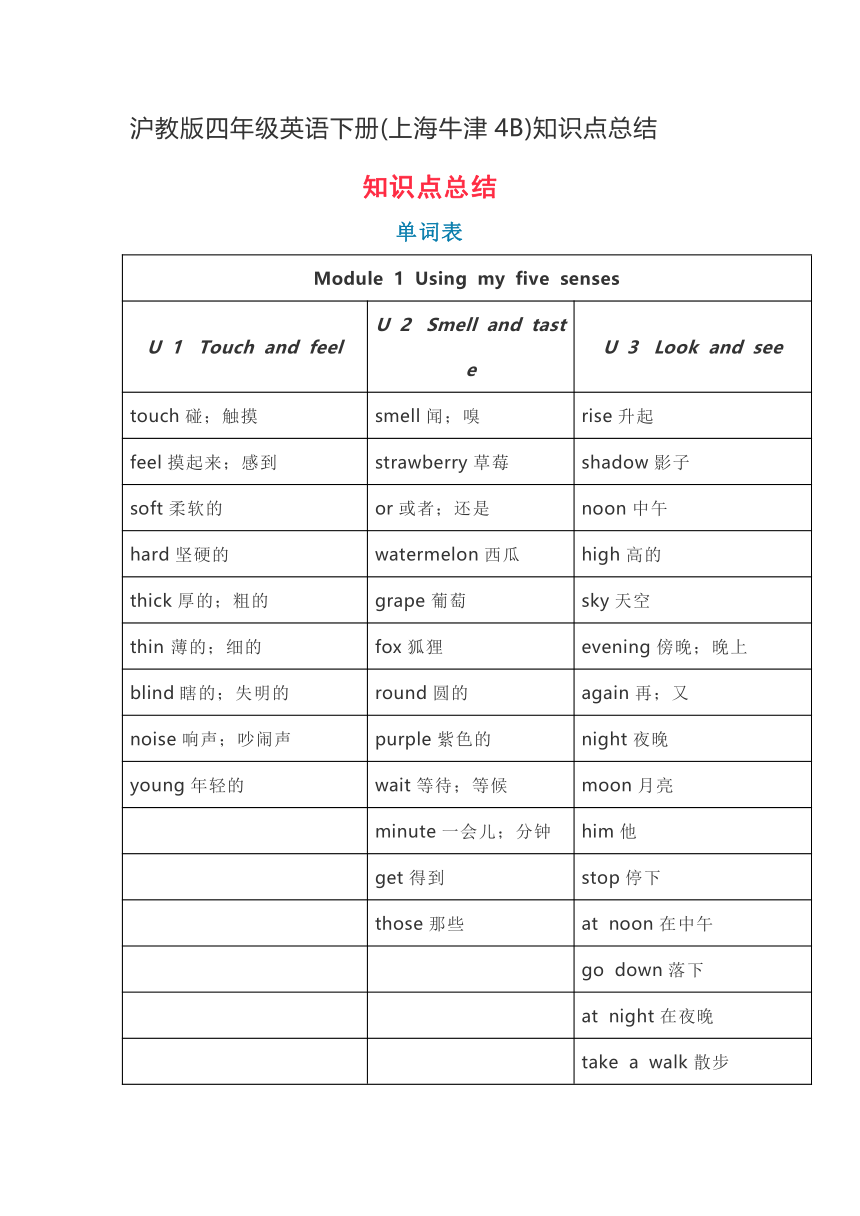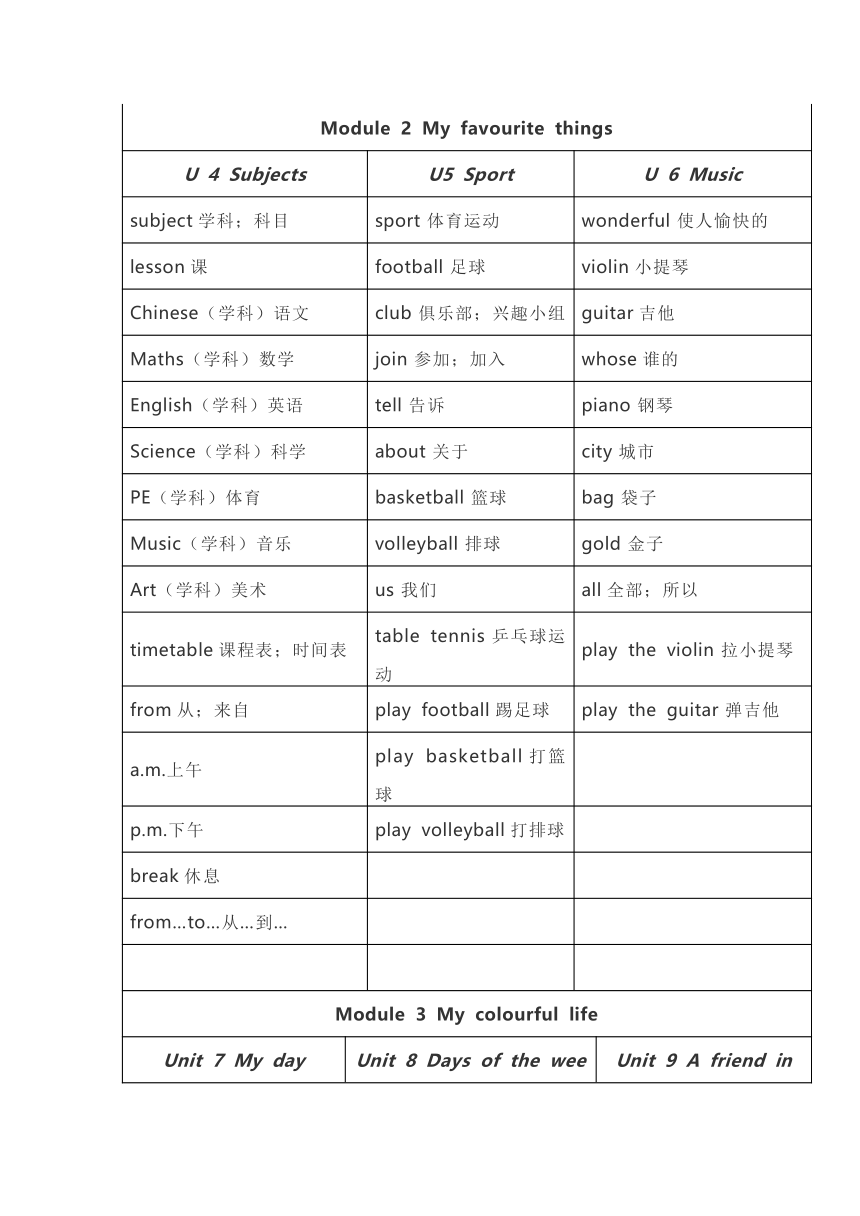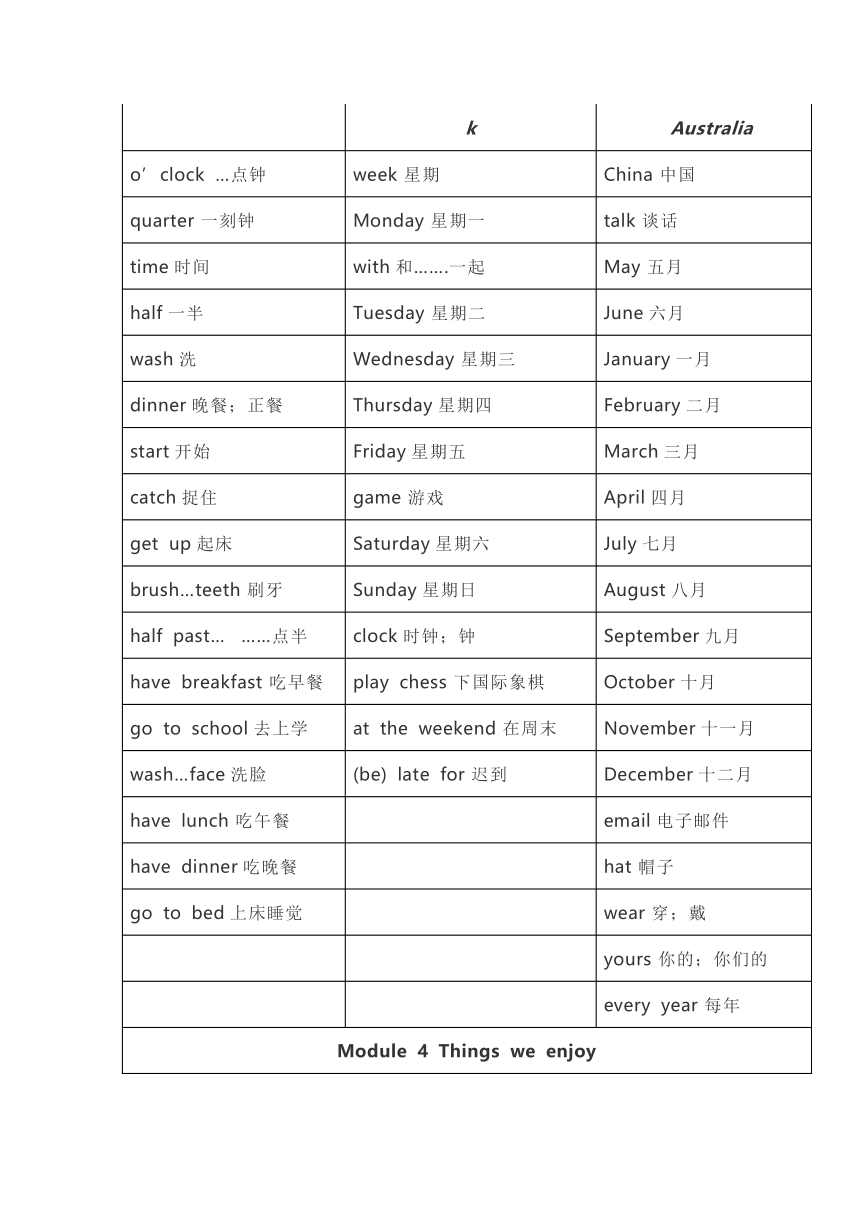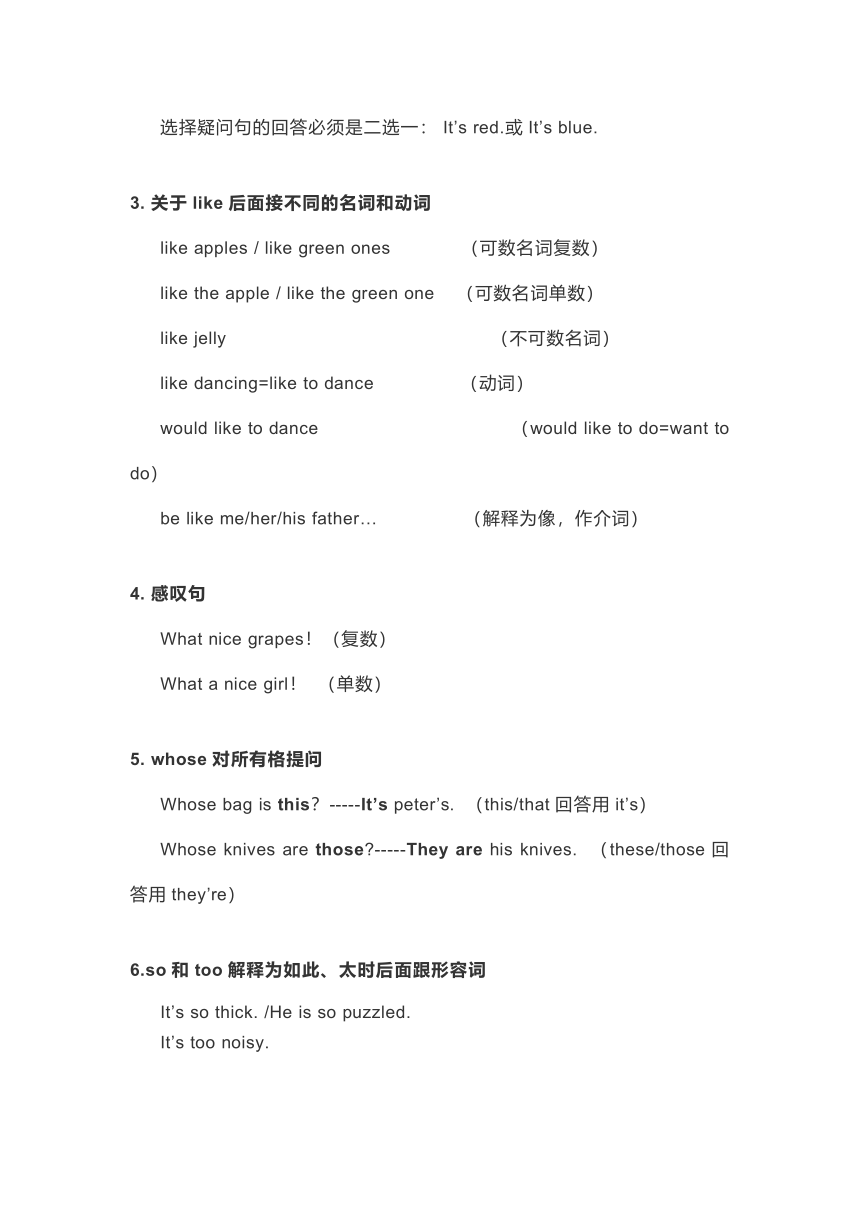牛津沪教版小学英语四年级下册知识点总结
文档属性
| 名称 | 牛津沪教版小学英语四年级下册知识点总结 |  | |
| 格式 | zip | ||
| 文件大小 | 19.3KB | ||
| 资源类型 | 教案 | ||
| 版本资源 | 牛津沪教版 | ||
| 科目 | 英语 | ||
| 更新时间 | 2019-05-08 08:55:28 | ||
图片预览





文档简介
沪教版四年级英语下册(上海牛津4B)知识点总结
知识点总结
单词表
Module 1 Using my five senses
U 1? Touch and feel
U 2 ?Smell and taste
U 3 ?Look and see
touch碰;触摸
smell闻;嗅
rise升起
feel摸起来;感到
strawberry草莓
shadow影子
soft柔软的
or或者;还是
noon中午
hard坚硬的
watermelon西瓜
high高的
thick厚的;粗的
grape葡萄
sky天空
thin?薄的;细的
fox狐狸
evening傍晚;晚上
blind瞎的;失明的
round圆的
again再;又
noise响声;吵闹声
purple紫色的
night夜晚
young年轻的
wait等待;等候
moon月亮
minute一会儿;分钟
him他
get得到
stop停下
those那些
at noon在中午
go down落下
at night在夜晚
take a walk散步
Module 2 My favourite things
U 4 Subjects
U5 Sport
U 6 Music
subject学科;科目
sport?体育运动
wonderful?使人愉快的
lesson课
football?足球
violin小提琴
Chinese(学科)语文
club?俱乐部;兴趣小组
guitar吉他
Maths(学科)数学
join?参加;加入
whose谁的
English(学科)英语
tell?告诉
piano?钢琴
Science(学科)科学
about?关于
city?城市
PE(学科)体育
basketball?篮球
bag?袋子
Music(学科)音乐
volleyball?排球
gold?金子
Art(学科)美术
us?我们
all全部;所以
timetable课程表;时间表
table tennis?乒乓球运动
play the violin?拉小提琴
from从;来自
play football踢足球
play the guitar?弹吉他
a.m.上午
play basketball打篮球
p.m.下午
play volleyball打排球
break休息
from…to…从…到…
Module 3 My colourful life
Unit 7 My day
Unit 8 Days of the week
Unit 9 A friend in ?Australia
o’clock …点钟
week?星期
China?中国
quarter?一刻钟
Monday?星期一
talk?谈话
time时间
with和…….一起
May?五月
half一半
Tuesday?星期二
June六月
wash洗
Wednesday?星期三
January一月
dinner晚餐;正餐
Thursday星期四
February二月
start开始
Friday星期五
March三月
catch捉住
game?游戏
April四月
get up起床
Saturday星期六
July七月
brush…teeth?刷牙
Sunday星期日
August八月
half past…? ……点半
clock时钟;钟
September九月
have breakfast?吃早餐
play chess?下国际象棋
October十月
go to school去上学
at the weekend?在周末
November十一月
wash…face洗脸
(be) late for?迟到
December十二月
have lunch?吃午餐
email电子邮件
have dinner吃晚餐
hat?帽子
go to bed上床睡觉
wear?穿;戴
yours?你的;你们的
every year?每年
Module 4 Things we enjoy
Unit 10 My garden
Unit 11 Children’s day
Unit 12 The ugly ?duckling
garden?花园
song?歌曲
ugly?丑的;丑陋的
plant?植物
zoo?动物园
duckling?小鸭
leaf?叶子
cinema?电影院
duck?鸭子
water?给……浇水
museum?博物馆
river?江;河
them他们;她们;它们
also?也;还
baby?宝宝
grow?生长;成长
have a party?举办聚会
later?后来;以后
seed?种子
quack(鸭叫声)嘎嘎
every day?每天
back?背;背部
away?去别处
swan?天鹅
into?朝;向;到……里面
语法复习
1.?量词的用法
There?is?a glass of water melon juice.
There?are?three glasses?of strawberry juice.
?
2.?选择疑问句和一般疑问句的区别
(1)?一般疑问句Is?the kite red?and?blue?(这风筝是蓝红色的吗?)
一般疑问句的回答??必须Yes或No开头? Yes, it is./No, it isn’t.
(2)?选择疑问句Is?the kite red?or?blue?(这风筝是蓝色还是红色?)
选择疑问句的回答必须是二选一:?It’s red.或It’s blue.
?
3.?关于like后面接不同的名词和动词
like apples / like green ones?????????????(可数名词复数)?
like the apple / like the green one????(可数名词单数)
like jelly?????????????????????????????????????????????????(不可数名词)
like dancing=like to dance????????????????(动词)
would like to dance???????????????????????????????????(would like to do=want to do)
be like me/her/his father…????????????????(解释为像,作介词)
?
4.?感叹句
What nice grapes!(复数)
What a nice girl!??(单数)
?
5. whose对所有格提问
Whose bag is?this?-----It’s?peter’s.??(this/that回答用it’s)
Whose knives are?those?-----They are?his knives.??(these/those回答用they’re)
?
6.so和too解释为如此、太时后面跟形容词
It’s so thick. /He is so puzzled.
It’s too noisy.
?
7. How+助动词+主语+动词
The pineapple is rough.?(划线提问)
How does the pineapple feel?
This cherry is?sweet.?(划线提问)
How does this cherry taste?
?
8.祈使句和can句型永远用动词原形,即使有now,也不能是进行时
祈使句??Let’s?make?a card now.
????????Kitty,?don’t put your book on the floor.(否定句在动词前加don’t)
can句型? Can Lucy?read?the book now?
(容易犯的错误:看见Lucy一个人就用三单reads,或看见now用进行时)
?
9. There be就近原则,后面所接词必须看清是否是可数名词从而确定be动词
There?is a?cat and two dogs.??????(离得近的是单数)
There?are two?dogs and a cat.??(离得近的是复数)
There?is?some?paper.??????????????????(不可数)
There?are?some?paper?rabbits.?(前面有修饰的名词复数)
There?are?some?sheep.??????????????(单复数相同)
There?is?some?string.??????????????????(不可数)
There?is?a lot of?apple juice.??????(前面有修饰的不可数)
?
10. both和all?放在be动词之后,do动词之前
We are both tall.??????????????????????????????????(be动词之后)
They are all blind.???????????????????????????????(be动词之后)
We both run fast.????????????????????????????????(do动词之前)
The brothers all touch the elephant.??????(do动词之前)
?
11. one of the?复数,谓语三单
One?of the boys is?Tom.
says?one of the brothers
?
12.?一般时和进行时的区别
进行时:当句子里有标志性的词如now,look,listen,it’s…几点(祈使句和can句型除外),或是某个有上下情景的句子表示这个动作现在正在发生,结构be+doing
Listen, birds?are singing.
Where’s Sam? He?is playing football outside.
?
一般时:当句子里有标志性的词如every morning, on Moday, at weedends, always, usually, often,sometimes,never, at…几点等,表示陈述某个事实。当主语是I,you,复数时谓语动词原形,当主语是第三人称单数时动词三单。
Our classmate watches?TV at weedends.?
(不能受our影响,主语是classmate单数,动词watch三单加es)
His friends?always?stay?at home.
?
对比:
It’s two o’clock. Kitty?is readinga book.
Kitty?reads?a book at twoo’clock.
?
13.?球类运动前不加the:?????playbasketball
三餐前不加the:?????????have dinner
乐器类前必须有the:?? play?the?drum
?
14.?将来时态,标志性词tomorrow,next Sunday等
will+do /be going to do
She will go to the park.
?
15.?过去式,标志性词last night
His clock stopped?at ten thirty last night.
?
16.时间的表达(一)
(1)整点:?six o’clock
(2)1-29分(15分除外)用past:? ten past seven???(7:10)
(3)15分:a quarter past two???(2:15)
(4)30分:half past five????(5:30)
(5)45分:a quarter to two??(1:45)
(6)30-59分(45分除外,用减法)用to:ten to seven???(6:50)
?
时间的表达(二):直接读数字
7:10?? seven ten
2:15?? two fifteen
5:30?? five thirty
?
17.?某些词后需要加ing:
go?shopping /fishing /swimming
finish?doing
learn?painting
?
18.?作为学科需要首字母大写
Music class??? Chinese class??? English class?? Math class
解释为音乐不需要大写?music room、I am the music man.
?
19.乐器以及声音
Ding-ding-------piano??? ???Ting-ting------triangle
Zing-zing------violin??????? Boom-boom-----drum
?
20.关于节日
节日一般具体到某一天用on:
on Children’s Day
但是在中国传统节日前介词用at,而且所有中国传统节日有the:
at?the Spring Festival
除了表达其他含义,介词可以变化:
before the Spring Festival?春节前
after the Spring Festival??春节后
What do you need for the Spring Festival????为春节准备
?
21.?介词+宾格,动词+宾格
eat all?of?them
I?want?them.
walk?behind?him
知识点总结
单词表
Module 1 Using my five senses
U 1? Touch and feel
U 2 ?Smell and taste
U 3 ?Look and see
touch碰;触摸
smell闻;嗅
rise升起
feel摸起来;感到
strawberry草莓
shadow影子
soft柔软的
or或者;还是
noon中午
hard坚硬的
watermelon西瓜
high高的
thick厚的;粗的
grape葡萄
sky天空
thin?薄的;细的
fox狐狸
evening傍晚;晚上
blind瞎的;失明的
round圆的
again再;又
noise响声;吵闹声
purple紫色的
night夜晚
young年轻的
wait等待;等候
moon月亮
minute一会儿;分钟
him他
get得到
stop停下
those那些
at noon在中午
go down落下
at night在夜晚
take a walk散步
Module 2 My favourite things
U 4 Subjects
U5 Sport
U 6 Music
subject学科;科目
sport?体育运动
wonderful?使人愉快的
lesson课
football?足球
violin小提琴
Chinese(学科)语文
club?俱乐部;兴趣小组
guitar吉他
Maths(学科)数学
join?参加;加入
whose谁的
English(学科)英语
tell?告诉
piano?钢琴
Science(学科)科学
about?关于
city?城市
PE(学科)体育
basketball?篮球
bag?袋子
Music(学科)音乐
volleyball?排球
gold?金子
Art(学科)美术
us?我们
all全部;所以
timetable课程表;时间表
table tennis?乒乓球运动
play the violin?拉小提琴
from从;来自
play football踢足球
play the guitar?弹吉他
a.m.上午
play basketball打篮球
p.m.下午
play volleyball打排球
break休息
from…to…从…到…
Module 3 My colourful life
Unit 7 My day
Unit 8 Days of the week
Unit 9 A friend in ?Australia
o’clock …点钟
week?星期
China?中国
quarter?一刻钟
Monday?星期一
talk?谈话
time时间
with和…….一起
May?五月
half一半
Tuesday?星期二
June六月
wash洗
Wednesday?星期三
January一月
dinner晚餐;正餐
Thursday星期四
February二月
start开始
Friday星期五
March三月
catch捉住
game?游戏
April四月
get up起床
Saturday星期六
July七月
brush…teeth?刷牙
Sunday星期日
August八月
half past…? ……点半
clock时钟;钟
September九月
have breakfast?吃早餐
play chess?下国际象棋
October十月
go to school去上学
at the weekend?在周末
November十一月
wash…face洗脸
(be) late for?迟到
December十二月
have lunch?吃午餐
email电子邮件
have dinner吃晚餐
hat?帽子
go to bed上床睡觉
wear?穿;戴
yours?你的;你们的
every year?每年
Module 4 Things we enjoy
Unit 10 My garden
Unit 11 Children’s day
Unit 12 The ugly ?duckling
garden?花园
song?歌曲
ugly?丑的;丑陋的
plant?植物
zoo?动物园
duckling?小鸭
leaf?叶子
cinema?电影院
duck?鸭子
water?给……浇水
museum?博物馆
river?江;河
them他们;她们;它们
also?也;还
baby?宝宝
grow?生长;成长
have a party?举办聚会
later?后来;以后
seed?种子
quack(鸭叫声)嘎嘎
every day?每天
back?背;背部
away?去别处
swan?天鹅
into?朝;向;到……里面
语法复习
1.?量词的用法
There?is?a glass of water melon juice.
There?are?three glasses?of strawberry juice.
?
2.?选择疑问句和一般疑问句的区别
(1)?一般疑问句Is?the kite red?and?blue?(这风筝是蓝红色的吗?)
一般疑问句的回答??必须Yes或No开头? Yes, it is./No, it isn’t.
(2)?选择疑问句Is?the kite red?or?blue?(这风筝是蓝色还是红色?)
选择疑问句的回答必须是二选一:?It’s red.或It’s blue.
?
3.?关于like后面接不同的名词和动词
like apples / like green ones?????????????(可数名词复数)?
like the apple / like the green one????(可数名词单数)
like jelly?????????????????????????????????????????????????(不可数名词)
like dancing=like to dance????????????????(动词)
would like to dance???????????????????????????????????(would like to do=want to do)
be like me/her/his father…????????????????(解释为像,作介词)
?
4.?感叹句
What nice grapes!(复数)
What a nice girl!??(单数)
?
5. whose对所有格提问
Whose bag is?this?-----It’s?peter’s.??(this/that回答用it’s)
Whose knives are?those?-----They are?his knives.??(these/those回答用they’re)
?
6.so和too解释为如此、太时后面跟形容词
It’s so thick. /He is so puzzled.
It’s too noisy.
?
7. How+助动词+主语+动词
The pineapple is rough.?(划线提问)
How does the pineapple feel?
This cherry is?sweet.?(划线提问)
How does this cherry taste?
?
8.祈使句和can句型永远用动词原形,即使有now,也不能是进行时
祈使句??Let’s?make?a card now.
????????Kitty,?don’t put your book on the floor.(否定句在动词前加don’t)
can句型? Can Lucy?read?the book now?
(容易犯的错误:看见Lucy一个人就用三单reads,或看见now用进行时)
?
9. There be就近原则,后面所接词必须看清是否是可数名词从而确定be动词
There?is a?cat and two dogs.??????(离得近的是单数)
There?are two?dogs and a cat.??(离得近的是复数)
There?is?some?paper.??????????????????(不可数)
There?are?some?paper?rabbits.?(前面有修饰的名词复数)
There?are?some?sheep.??????????????(单复数相同)
There?is?some?string.??????????????????(不可数)
There?is?a lot of?apple juice.??????(前面有修饰的不可数)
?
10. both和all?放在be动词之后,do动词之前
We are both tall.??????????????????????????????????(be动词之后)
They are all blind.???????????????????????????????(be动词之后)
We both run fast.????????????????????????????????(do动词之前)
The brothers all touch the elephant.??????(do动词之前)
?
11. one of the?复数,谓语三单
One?of the boys is?Tom.
says?one of the brothers
?
12.?一般时和进行时的区别
进行时:当句子里有标志性的词如now,look,listen,it’s…几点(祈使句和can句型除外),或是某个有上下情景的句子表示这个动作现在正在发生,结构be+doing
Listen, birds?are singing.
Where’s Sam? He?is playing football outside.
?
一般时:当句子里有标志性的词如every morning, on Moday, at weedends, always, usually, often,sometimes,never, at…几点等,表示陈述某个事实。当主语是I,you,复数时谓语动词原形,当主语是第三人称单数时动词三单。
Our classmate watches?TV at weedends.?
(不能受our影响,主语是classmate单数,动词watch三单加es)
His friends?always?stay?at home.
?
对比:
It’s two o’clock. Kitty?is readinga book.
Kitty?reads?a book at twoo’clock.
?
13.?球类运动前不加the:?????playbasketball
三餐前不加the:?????????have dinner
乐器类前必须有the:?? play?the?drum
?
14.?将来时态,标志性词tomorrow,next Sunday等
will+do /be going to do
She will go to the park.
?
15.?过去式,标志性词last night
His clock stopped?at ten thirty last night.
?
16.时间的表达(一)
(1)整点:?six o’clock
(2)1-29分(15分除外)用past:? ten past seven???(7:10)
(3)15分:a quarter past two???(2:15)
(4)30分:half past five????(5:30)
(5)45分:a quarter to two??(1:45)
(6)30-59分(45分除外,用减法)用to:ten to seven???(6:50)
?
时间的表达(二):直接读数字
7:10?? seven ten
2:15?? two fifteen
5:30?? five thirty
?
17.?某些词后需要加ing:
go?shopping /fishing /swimming
finish?doing
learn?painting
?
18.?作为学科需要首字母大写
Music class??? Chinese class??? English class?? Math class
解释为音乐不需要大写?music room、I am the music man.
?
19.乐器以及声音
Ding-ding-------piano??? ???Ting-ting------triangle
Zing-zing------violin??????? Boom-boom-----drum
?
20.关于节日
节日一般具体到某一天用on:
on Children’s Day
但是在中国传统节日前介词用at,而且所有中国传统节日有the:
at?the Spring Festival
除了表达其他含义,介词可以变化:
before the Spring Festival?春节前
after the Spring Festival??春节后
What do you need for the Spring Festival????为春节准备
?
21.?介词+宾格,动词+宾格
eat all?of?them
I?want?them.
walk?behind?him
同课章节目录
- Module 1 Using my five senses
- Unit 1 Touch and feel
- Unit 2 Smell and taste
- Unit 3 Look and see
- Module 2 My favourite things
- Unit 4 Subjects
- Unit 5 Sport
- Unit 6 Music
- Module 3 My colourful life
- Unit7 My day
- Unit8 Days of the week
- Unit9 A friend in Australia
- Module 4 Things we enjoy
- Unit10 My garden
- Unit11 Children's Day
- Unit12 The ugly duckling
